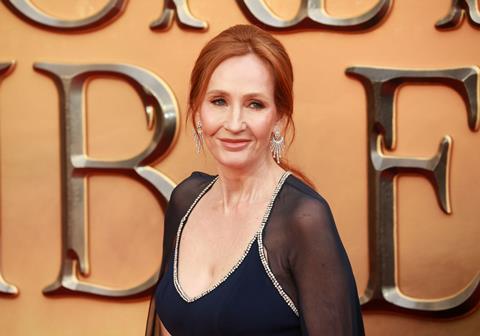Christians have often felt on the backfoot when it comes to debates around issues such as sexuality, abortion and transgender. But Peter Lynas believes significant shifts are taking place in Western culture and there are good reasons to be optimistic

In December 2019, J.K. Rowling sent a tweet that sparked a firestorm. She expressed her support for Maya Forstater, a woman who lost her job after defending the reality of biological sex. In the years since, Rowling has faced severe backlash, with many calling for her cancellation.
Five years on, her only regret is that she did not speak out sooner in support of woman’s rights and the appalling medical experiment on children. Her position seemed vindicated earlier this month when the Health Secretary, supported by both Labour and Conservative parties, announced a ban on puberty blockers for children - a rare political consensus in today’s climate.
Over the past few years, Christians and others who have engaged in these heated cultural debates have been told they were “on the wrong side of history.” Yet, as history unfolds, it appears the lines are becoming less clear. What once seemed like fringe views may now be shifting toward the mainstream. The discourse surrounding transgender rights is perhaps the clearest example, but conversations about assisted suicide, abortion, and sexuality are also showing signs of changing for the better.
Rowling’s Defiance
When Rowling first voiced her concerns, some of the Harry Potter stars and many in the public sphere disowned her, blinded by their commitment to the trans rights agenda. Yet Rowling didn’t back down. She continued to speak out, explaining her views: she respects personal freedoms, but believes sex is a biological reality with real-world consequences. Rowling raised alarm over the impact of the transgender movement on women’s healthcare, education, safeguarding, and freedom of speech. She also pointed to troubling issues around self-identification laws and cases of de-transitioning.
Rowling put her considerable wealth behind her views funding a rape crisis centre that only employs women, after other centres allowed men identifying as women into women’s-only spaces. In April of this year, she publicly challenged Police Scotland to arrest her under the new Hate Crime and Public Order Act, which they declined to do.
Rowling’s unwavering position created space for others to speak out. Sharron Davies and Martina Navratilova raised their concerns about trans women in women’s sports. Last week The Lawn Tennis Association announced that only those born biologically female will be allowed to compete in the female category. That decision follows similar rulings in other sports, such as swimming (Swim England has had the same policy since 2023). At a swim gala, a parent thanked me for my own engagement in this area saying, “Its not fair that our daughters might have to swim against boys, and its definitely not right they might have to share a changing room with boys.”
A new approach to trans?
One pivotal moment in this ongoing conversation was the publication of the Cass Review earlier this year. Dr. Hilary Cass’s interim report led to the closure of the Tavistock Clinic, the UK’s largest gender identity service for children. The final report criticised the lack of solid evidence behind medical interventions for gender-dysphoric youth, calling gender medicine for children “built on shaky foundations.”
Back in April I wrote, “It is hoped that this report will be a turning point in a global conversation that has often turned toxic.” Indeed the report has had ripple effects across the globe, challenging countries such as Canada and Australia, which have largely affirmed a more unquestioning approach to gender transition for children. In contrast, nations such as France, Sweden, Norway, and the United States are becoming more cautious in their approach, taking note of the Cass Review’s findings. Even the UK Charity Commission recently flagged the mismanagement of Mermaids, a trans youth charity, for promoting harmful practices, such as providing chest binders to children, and has urged them to adopt more evidence-based methods based on the Cass Review.
As the transgender conversation has evolved, even once-steadfast allies have begun to reassess their positions. Matthew Parris, one of the founders of Stonewall, has publicly criticised the organisation for its extreme stance on trans rights. The growing fractures within the LGBT communities signal a larger reckoning, with some calling for Stonewall to refocus on LGB rights and separate itself from the T, an issue that highlights the broader fragmentation of once-unified progressive causes.
Other shifts
Beyond the transgender debate, other deeply controversial topics are also shifting. When Kim Leadbeater MP introduced her assisted suicide bill, it was presumed it would pass easily. While it did move forward, the close vote and the silence that followed it showed the weight of the issue being discussed. The issue of euthanasia carries heavy moral and societal weight. I was deeply disappointed by the result, but it has sparked a national conversation about end of life care and there is still a way to go before the bill becomes law.
Christianity provides the foundation for true equality and human rights
Similarly, discussions around abortion have heated up, especially after the US Supreme Court’s overturning of Roe v. Wade. In the UK, the BBC aired a documentary titled Young, British and Anti-Abortion, which showcased a growing pro-life movement among Generation Z. Leaders such as Madeline Page and Eden McCourt are gaining traction, with their grassroots campaigns challenging the prevailing pro-choice narrative. Their stories reveal a new generation pushing back against abortion’s normalisation and gaining increasing support.
In the realm of sex education, parents are raising alarms about the growing influence of third-party sex education providers in schools. While schools aim to remain neutral, this “Wild West” approach to sex education has led to confusion and concern about what children are actually learning. Former education secretary Gillian Keegan affirmed that parents have the right to know what is being taught in schools, and there is now a legal push for full transparency in Relationship, Sex, and Health Education (RSHE) programs.
The Case Against the Sexual Revolution
A powerful cultural critique has also emerged in the form of The Case Against the Sexual Revolution by Louise Perry, a leading feminist. Perry argues that the sexual revolution, far from liberating women, has exploited them, turning sex into a transactional act devoid of love or commitment. In Perry’s view, modern sexual culture - characterised by casual sex, hook-up culture, and promiscuity - has left women vulnerable to exploitation and emotional harm.
Perry contends that the ideal of mutual respect, love, and faithfulness, embodied in the institution of marriage, offers a better model. Her thesis resonates with the Christian moral foundation that once reshaped Western notions of sexuality, emphasising the sacredness of sex within committed relationships. Perry acknowledges that feminism, in its most genuine form, is deeply rooted in Christian ethical teachings about mutual respect and human dignity.
A better story
As followers of Jesus, we have the opportunity to offer a better story - one where dignity, value, and worth are inherent in every human being because we are all made in God’s image.
Christianity provides the foundation for true equality and human rights. The biblical story is centred on the moment that divides history as we know it and dates every conversation; the moment that allows and invites each of us to be on the right side of history. This moment in history - where conversations on transgenderism, sexuality, and the sanctity of life are at the forefront - invites us to stand firm in truth and love.
While these discussions may be difficult and divisive, they offer an opportunity to engage in profound cultural renewal. The hope is not in conforming to societal trends but in offering a compelling alternative rooted in the dignity of every person, the value of life, and the beauty of human relationships. In doing so, we can truly be on the right side of history.





































1 Reader's comment